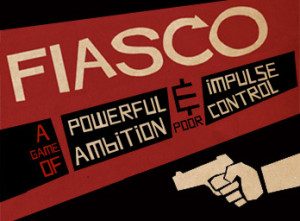Fiasco Reflection
In the classes leading up to the date I was supposed to play Fiasco, I kept hearing Professor Morgen reinforce the sentiment that your game of Fiasco is your work of writing. This left me with both confusion and anticipation, as I wondered how a role playing table top game could be interpreted as a body of writing; however, eventually this notion began to clear up.
Actually before it cleared up it got even worse. I read all the way through the instructions and watched a video about the game set up, and confusion remained. I pretty much was banking on the fact that my group members had a better understanding than I did. Unfortunately, this wasn’t the case, and we were all in the same boat. After three different attempts of setting up the game in the correct way, and an hour later, we finally set the entire game up, and we were ready to create scenes for our narratives.
Finally, I was no longer confused. It quickly became clear that Fiasco is all about creating stories and scenes. In my specific game my group chose the playlet “Suburbia,” and I had one relationship where we were church volunteers, and another labeled as conman/mark. You can see the kind of crazy personas you can create just from seeing some of the relationship options.
When creating scenes the game encourages you to collaborate with the other players so you can come up with the wackiest yet fitting story. This is an interesting aspect of the game, as most people (including me) are quite defensive about their writing, and prefer it to be a solitary activity. I found collaboration to be so successful because there are really no winners or losers in Fiasco, everyone is just playing to try to create a good story. Because it’s hard to act out of self interest, I found myself more willing to listen to other people’s advice. Additionally, in order to make it fun, creativity is vital, and I’ve found that creativity is best captured through bouncing ideas off of other people.
I am content with the story my group created, but I believe that the more experience you have playing Fiasco the better the story would become. In my game it seemed like that when we felt trapped, or if we didn’t know what move to make, we would just send someone to jail. Ben went to jail 3 separate times, and I was arrested once too. While the stories were all still entertaining, I think with some more experience we could pick up on some strategies that provoke a more developed narrative.
Overall, I think my first shot at Fiasco was a success. It certainly took a period of adjustment, but playing with people who are all playing for the very fist time, that wasn’t completely unexpected. The message that will remain with me from playing Fiasco is that I created a story I wouldn’t have ever been able to come up with on my own. In this sense I received help from the manner in which Fiasco is set up, as well as my group members. The table top game undoubtedly encourages collaboration as a learning outcome. I’d be interested to see if playing again would yield a more developed story.





